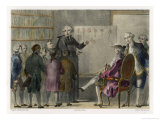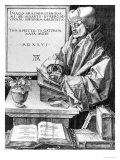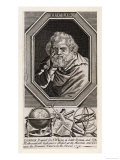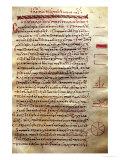|
|
|
Umberto Eco
b. 1-5-1932; Alessandria, Piedmont, Italy
Novelist, medievalist, semiotician, philosopher, professor, and literary critic Umberto Eco is the author of several bestselling novels, essays, academic texts and children's books.
Umberto Eco quotes ~
• “Semiotics is in principle the discipline studying everything which can be used in order to lie. If something cannot be used to tell a lie, conversely it cannot be used to tell the truth: it cannot in fact be used "to tell" at all. ”
• “A democratic civilization will save itself only if it makes the language of the image into a stimulus for critical reflection — not an invitation for hypnosis.”
• “To read fiction means to play a game by which we give sense to the immensity of things that happened, are happening, or will happen in the actual world. By reading narrative, we escape the anxiety that attacks us when we try to say something true about the world. This is the consoling function of narrative — the reason people tell stories, and have told stories from the beginning of time.”
|
|
|
|
|
|
|
Betty Edwards
b. 1926; San Francisco
Art teacher and author Betty Edwards is best known for her 1979 book, Drawing on the Right Side of the Brain.
Betty Edwards quotes ~
• “Ability to draw depends on ability to see the way an artist sees, and this kind of seeing can marvelously enrich your life.”
• “When you see in the special way in which experienced artist see, then you can draw.”
• “Art has this long history, predating even language, of expressing nonverbal information.”
|
|
|
|
Albert Einstein
b. 3-14-1879; Ulm, Germany
d. 4-18-1955; Princeton, NJ
“Imagination is more important than knowledge.”
available only at-
Creative Process
• more Albert Einstein posters
Albert Einstein quotes ~
• “The only thing that interferes with my learning is my education.”
• “Education is what remains after one has forgotten everything he learned in school.”
• “The aim (of education) must be the training of independently acting and thinking individuals who, however, can see in the service to the community their highest life achievement.”
• “Most teachers waste their time by asking questions which are intended to discover what a pupil does not know, whereas the true art of questioning has for its purpose to discover what the pupil knows or is capable of knowing.”
• “It is, in fact, nothing short of a miracle that the modern methods of education have not yet entirely strangled the holy curiosity of inquiry; for this delicate little plant, aside from stimulation, stands mainly in need of freedom; without this it goes to wrack and ruin without fail. It is a very grave mistake to think that the enjoyment of seeing and searching can be promoted by means of coercion and a sense of duty. To the contrary, I believe that it would be possible to rob even a healthy beast of prey of its voraciousness, if it were possible, with the aid of a whip, to force the beast to devour continuously, even when not hungry, especially if the food, handed out under such coercion, were to be selected accordingly.”
|
|
|
|
Loren Eiseley
b. 9-3-1907; Lincoln, NE
b. 7-9-1977; Philadelphia
Loren Eiseley, an anthropologist, educator, philosopher, and natural science writer, was referred to as “the modern Thoreau”.
Loren Eiseley quotes ~
• “It is frequently the tragedy of the great artist, as it is of the great scientist, that he frightens the ordinary man.”
• “It was the failures who had always won, but by the time they won they had come to be called successes. This is the final paradox, which men call evolution.”
• “If there is magic on this planet, it is contained in water.”
• “If it should turn out that we have mishandled our own lives as several civilizations before us have done, it seems a pity that we should involve the violet and the tree frog in our departure.”
• “The creative element in the mind of man . . . emerges in as mysterious a fashion as those elementary particles which leap into momentary existence in great cyclotrons, only to vanish again like infinitesimal ghosts.”
• “Like the herd animals we are, we sniff warily at the strange one among us.”
|
|
|
|
Abbe Charles-Michel de l'Épée,
b. 11-25-1712; Versailles, France
d. 12-23-1789; Paris
Épée, in the philantropic spirit of the 18th century, believed that deaf people were capable of language, and dedicated himself to developing a manual for signing langauge so the deaf could receive the sacraments, thus avoid going to hell. He has become known as the “Father of the Deaf.”
• alphabet posters- sign language
• hearing posters
|
|
|
|
|
|
|
Jaime Escalante
b. 12-31-1930; La Paz, Bolivia
d. 3-30-2010; near Sacramento, CA (bladder cancer)
Jaime Escalante, a professor and teacher of mathematics, gained renown and distinction for his work between 1974 and 1991 at Garfield High School in Los Angeles, California in teaching students calculus.
|
|
|
|
|
Simon Estes
b. 8-13-1938; Centerville, Iowa
Bass-baritone singer Simon Estes international opera career began in the Europe in the 1960s where racial prejudice was not as difficult of a problem. Beginning in 1981 he sang with the Metropolitan Opera in NYC.
Estes has established scholarships and teaches voice.
|
|
|
|
Euclid
ca. 325 BC–265 BC, Alexandria
Euclid of Alexandia, “The Father of Geometry”, was a Greek mathmematician who, in his Elements, set forth his principles of geometry proving mathematical theorems from a small set of axioms or accepted principles.
Euclid's Elements is one of the oldest treatises on mathematics and is considered the most influential textbook ever written, being instrumental in the development of logic and modern science.
• philosopher posters
|
|
|
|
|
|
|
|
|
|
|
|
|
|
|
















